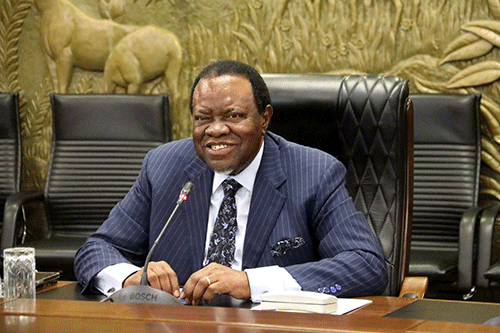Kuzeeko Tjitemisa
President Hage Geingob has reiterated that the current wave of African leaders believe in democratic processes, systems and institutions, and are not big men who impose their will on the people.
Addressing the International Summit on Constitutionalism and Democratic Consolidation in Africa currently underway in Gaborone, Botswana yesterday, Geingob pleaded with other African leaders to step up their efforts to combat tribalism, youth unemployment and corruption, saying these rob ordinary citizens.
He observed that without effective governance, including accountability and transparency, the future of democracy and constitutionalism is bleak. “We are not big men imposing our will on citizens through force or the barrel of the gun,” he said. The term ‘big man syndrome’ refers to a corrupt, autocratic and often totalitarian rule of countries by a single person.
Speaking on the theme ‘Pathways to Consolidating Constitutionalism, Going Forward’, Geingob said “as we push ahead to implement Agenda 2063: The Africa We Want of the African Union, the moment is indeed right to further reflect on the state of democracy in Africa, and specifically the twin questions of constitutionalism and term limits.”
He stated that a historical analysis of Africa’s democratic experiment informs his optimistic view of the continent’s state of democracy, and prospects for further democratic consolidation.
To appreciate the progress of the African democratic experience, Geingob said he borrowed from the work of scholar Samuel Huntington, who at the beginning of the 1990s theorised in his book ‘Democracy’s Third Wave’ about the prospects for democracy in the developing world, including Africa.
“There is no doubt that the trajectory of democracy in Africa has been anchored through the emerging African Governance Architecture,” he said in his virtual address.
The President added that the milieu of African governance and the evolution of democracy can be best understood by what he postulates to be the “three waves of African leadership’. He said the focus in this third wave of African leadership, which is consistent with the theme of the summit, is to strengthen processes, systems and institutions so as to accountably and effectively deliver public services and build trust.
“I believe that as the elected representatives of the sovereigns who vote us into office, we can only build trust with the voters when we are transparent and accountable – hence
my mantra: accountability plus transparency equals trust,” he continued.
The third wave of African leaders thus come through the ballot paper, which is the weapon of choice for them. “Even when you look at the question of term limits over a three-decade historical period since the end of the Cold War, you will notice that many African governments have subscribed to the idea of term limits,” Geingob noted.
“I can confidently say that the transition to the third wave of African leadership is showing an upward trend, and I don’t see a return to non-democratic transitions in Africa.” The key issue is thus to ensure the sustainability of African democracies by delivering prosperity through effective governance. The summit, which started yesterday and is set to end tomorrow, is being co-hosted by Botswana and the National Democratic Institute (NDI).
It will provide political leaders, members of civil society, academia, the media, regional institutions and opinion leaders with an opportunity to deliberate and exchange views on constitutional rule, democracy and good governance in Africa.
There will also be a series of panel discussions focussing on women’s political leadership in Africa; African youth and politics; as well as civil society and grassroots mobilisation.


